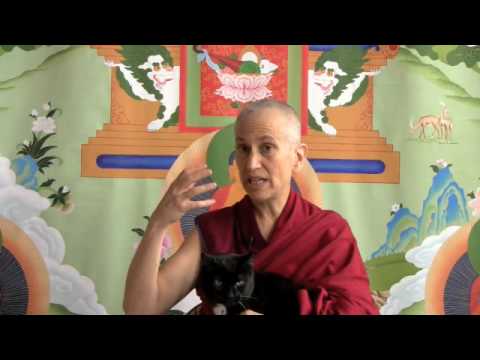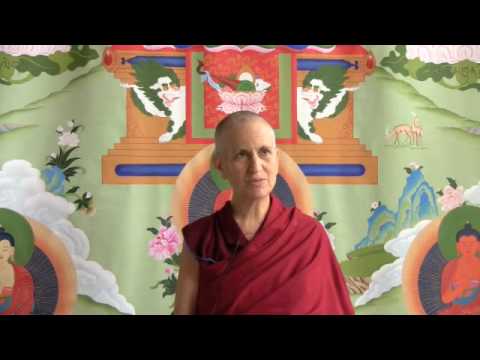Dependent arising: Dependent designation
Part of a series of Bodhisattva's Breakfast Corner talks given during the Green Tara Winter Retreat from December 2009 to March 2010.
- Something doesn’t exist as a certain object until it is labeled by that name
- Things don’t vanish if we don’t label them, but that doesn’t mean that everything we label exists
- The difference in philosophical schools regarding dependent arising
Green Tara Retreat 056: Dependent arising and dependent designation (download)
Part 1:
Part 2:
We talked about one scheme of organizing the different types of dependent arising:
- the causal dependence
- then dependence on its parts which pertains also to permanent phenomena
- and then the third one is dependent designation.
This third one means arising in dependence upon term and concept, which they also call existing by being mere name. What this means is that something doesn’t exist as a certain object until it is labeled by that name. The classic example they give which is very simple. It’s this: you didn’t become David until your parents labeled you David. The kitty didn’t become Manjushri until we labeled him Manjushri. The idea is that those things don’t exist as that particular object until they are labeled.
Sometimes when you label something it really changes the function of it. Sometimes it doesn’t. For example, after Obama was elected he wasn’t the president, he was president-elect. Then there’s a ceremony and suddenly we put the label president on and his whole role changes. Also his identity changes because then he’s imbued with the power of the president. Whereas other things may not change so much if they’re given a name, such as between “baby” and “David,” or between “cat” and “Achala” [the name of one of our cats]. It doesn’t change so much by giving the label.
Another example of how things change a lot by giving the label is how they talked about building a house in the days when you didn’t have a special kitchen (no plumbing, etc.). Something didn’t become the kitchen until we conceptualized, “Oh, that room is the kitchen.” Then it became the kitchen. Before that it wasn’t the kitchen and it could’ve been something else.
It’s interesting, this whole concept of the label “mine” and how much something changes as soon as we label it “mine.” It’s only a change of label. In terms of the substantial cause of the object, in terms of how it arose and those kinds of things, that doesn’t change at all. But as soon as we give it the label “mine,” wow, in our mind it’s completely different, isn’t it? Like night and day. There are things like that where they actually change quite drastically.
The question comes up, “What about 500 years ago when they didn’t know about cancer? Did cancer exist?” That’s the question people always ask our teachers because they always say something doesn’t exist unless it has a term and label. There wasn’t the label “cancer” 500 years ago. Does that mean it didn’t exist? But how could that be, because people still died from it, didn’t they? The idea is this: at that time it wasn’t known as cancer because it wasn’t labeled as cancer, but it had another label. It was labeled disease or illness or something like that. So people died from an illness although they didn’t necessarily die from cancer. Or people recovered from the illness although they didn’t necessarily recover from cancer because that label wasn’t there at that particular time. But there was another label there so the object still existed and still could function.
The Tibetans have a cute story regarding this because the question comes up. It’s a bit like our puzzle that if nobody’s in the forest to hear the sound, is there really a sound? Their version is: if nobody is there to label the object, does it exist? His Holiness tells this story about somebody who went to see a very high lama. They were talking about all this—discussing labels and things. Tibetan architecture had many pillars. At one point during the discussion, the lama commented, “Gee! I should be glad things don’t have to be continuously labeled for them to exist otherwise this pillar will vanish and the room will fall down on me.”
It isn’t that things just totally vanish if they are not being labeled. On the other hand, it doesn’t mean that everything we label actually exists. We can label “rabbit’s horn,” we can conceive of rabbit’s horn. We certainly conceived of weapons of mass destruction in Iraq and labeled them. But just because there’s a term and concept, doesn’t mean that there’s an object. Why? Because you need not only the term and concept, but you need a basis of designation that is suitable to bear that label. What was there in Iraq? There was nothing suitable to bear that label. How about with the rabbit’s horn? The rabbits have ears but there’s nothing suitable to bear the label “rabbit’s horn.” It doesn’t mean that everything we label exists. Just as we learn that everything we think doesn’t exist either.
Audience: Are the three types of dependent arising held by all the four tenet schools?
Venerable Thubten Chodron (VTC): No. The causal dependence is common to all of the different traditions. The other two are not really so common, especially in terms of parts referring to permanent phenomena. Most of the schools for permanent phenomena say that they’re merely labeled, that they’re just conceived of and then given a label. But for them, when they say that things are just conceived of and labeled, it’s not the same as what Prasangika’s mean. For example, the Lower Schools would say non-obstructive space that exists; there’s nothing there to label it space. There’s nothing there. So it exists by means of our own concept only, that’s all. Whereas, they would say that’s imputed by term and concept. Whereas they would look at the table, or the glasses, or the recorder, or you and me—and they’d say these things are not merely imputed, where “merely” negates inherent existence. Instead they would say, like people, that they all truly exist. But with people they would say, people imputedly exist in the sense that to identify a person you have to identify one of their aggregates. You don’t identify the person directly; you know it by means of the aggregates. So, in that way, that is how they would say the person is labeled.
But the Prasangika say it’s not just that you have to notice one of the aggregates as the Lower Schools assert. Prasangika say there’s nothing else there except your term and label—and that’s the mere thing that exists. There’s nothing in the basis that can be identified as the person; whereas the Lower Schools always find something in the basis of designation that they say is the person. For them it’s either the mental consciousness or the continuity of mental consciousness. The Cittamatrins hold that there’s this foundation consciousness because they all [i.e., all the Lower Schools] say there’s got to be something that, at the end of the day, you can say is the person that carries the karmic seeds. Otherwise, how does this karma get from one life to the next life? Whereas the Prasangika say, it’s just the “mere I.” When you try and identify within the aggregates, “What is the ‘mere I?’” there’s nothing you can point to.
The word imputed is used in a lot of different ways according to different schools. It can sometimes be a little confusing because they’ll give different definitions to the word and they’ll include and exclude different things as well.
Audience: I was thinking that when you gave an example of the sound in the forest, and how the Mind Only [Cittamatrins] have their solution for that. I’m wondering then how they think of term and concept. It must be quite different from the Prasangika.
VTC: Yes. It’s quite different. But like with the sound in the forest, they would say, well the ants and the deer heard the tree fall because they had the seeds on their foundation consciousness for that to happen.
Audience: Just a quick clarification to see that, if permanent phenomena don’t rely on causes and conditions, is there any phenomenon that doesn’t rely on the other two types of dependent arising?
VTC: All phenomena are composed of parts, depend on parts, and all phenomena from the Prasangika viewpoint depend on being labeled by term and concept. And for the Prasangika, and the Lower Schools too, it’s only the caused phenomena, the functioning things that are dependent on causes and conditions.
Venerable Thubten Chodron
Venerable Chodron emphasizes the practical application of Buddha’s teachings in our daily lives and is especially skilled at explaining them in ways easily understood and practiced by Westerners. She is well known for her warm, humorous, and lucid teachings. She was ordained as a Buddhist nun in 1977 by Kyabje Ling Rinpoche in Dharamsala, India, and in 1986 she received bhikshuni (full) ordination in Taiwan. Read her full bio.


